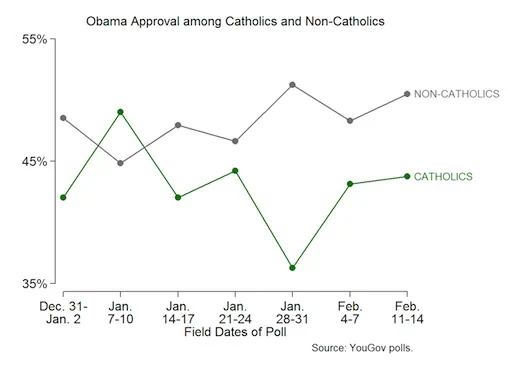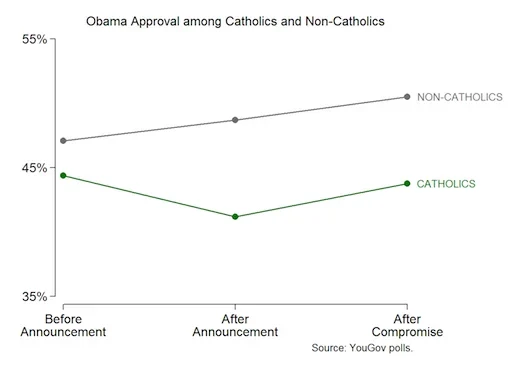Did the the contraception contretemps hurt Obama's standing among Catholic voters? Despite endless speculation about this, evidence has been in short supply. With some newly released data from YouGov, I can shed some light on this question.
Here is the percent who approve of Obama among both Catholics and non-Catholics in the last 7 weeks of YouGov/Economist polls.

A timeline of events in the contretemps is here. The announcement occurred on Friday, January 20, just before a YouGov poll went into the field. It registered no apparent effect, relative to the previous week's poll. However, the following week, there was an 8-point drop in support among Catholics. The timeline identifies the weekend of Jan. 28-29 as the time when "Dioceses are told to talk about the decision during worship services." But then this dip is erased in the Feb. 4-7 poll even though the controversy continued unabated and the president's compromise was still several days away. Another explanation for the increase in approval -- the good news in the Feb. 3 jobs report -- seems less plausible since there is no similar increase among non-Catholics. There is no apparent reason why Catholics would react to the jobs report differently than others.
If some of this variation is just sampling fluctuation, we might get better purchase on trends in opinion by combining polls. It makes some sense to divide the polls into 3 periods: prior to the Jan. 20 announcement (3 polls), after the announcement but before the Feb. 10 compromise (3 polls), and then after the compromise (the Feb. 11-14 poll).
When we do that, a different pattern characterizes Catholics and non-Catholics. Approval among non-Catholics increased slightly across the 3 periods: from 47% to 49% to 50%. But among Catholics there was a 3-point dip after the Jan.20 announcement (from 44% to 41%) and then a rebound after the compromise (back to 44%). This is consistent with the story that the contraception debate hurt Obama, if only slightly.

We can get some other purchase on this by distinguishing among Catholics. First, it seems logical to assume that approval would dip more sharply among those Catholics who attend church. Other polling by the Pew Center has found that churchgoing Catholics were more likely than other Catholics to report hearing about this debate and hearing their priest talk about it (see, for example, this anecdote). I compared those who attended church at least once as week to those who attended less frequently or not at all. The pattern was the consistent with what you would expect: approval was largely unchanged among Catholics who do not attend church weekly but among Catholic churchgoers it dropped from 42% before the announcement to 34% in the 3 weeks after the announcement -- before rebounding to 41% in the Feb. 11 poll.
We can also compare Catholics of different ideological persuasions. Most Catholic liberals approve of Obama and this does not change during the period. Indeed, if anything, approval increases slightly -- from 80% to 82% -- after the announcement is made. Among Catholic moderates, approval dropped slightly after the announcement (about 1.5 points). Among Catholic conservatives, it dropped by 4 points (from 17% to 13%). Meanwhile, non-Catholic conservatives did not evince this same pattern, suggesting that it was distinctive of Catholics, not conservatives generally.
The same pattern emerges once more if we compare Catholics by their views of abortion. Among Catholics who believe abortion should always be legal (about 25% of Catholics in this sample), the drop after the announcement is about 3 points. The same is true among the 51% of Catholics who believe that abortion should be legal in some cases but illegal in others. But among the 17% who believe it should always be illegal, the drop was 8 points. These patterns are not evident among non-Catholics. In the post-compromise Feb. 11-14 poll, opinion among pro-life Catholics returns nearly to its previous level before the announcement.
Although I've already pushed these data very hard, let me give them one final shove. The largest drop of all should be evident among Catholics who are both pro-life and weekly churchgoers. That's exactly what happened: Obama approval among this group drops 16 points after the announcement. This same pattern was not true among pro-life churchgoers who aren't Catholic. And again, Obama approval increases among these Catholics in the poll conducted after the compromise.
I can offer one last piece of circumstantial evidence. The patterns above -- larger drops in Obama approval among Catholics who are regular churchgoers, conservative, and/or pro-life -- would be more persuasive if these groups of Catholics were more opposed to the Obama administration's original decision to require religious organizations to provide contraceptive coverage to employees.
In the Feb. 11-14 poll, respondents were asked whether health insurance plans should provide access to birth control. Supporters of this idea were then asked whether religious organizations should receive an exemption. Altogether, 35% support birth control access in health insurance plans, 13% support it with an exemption for religious organizations, 31% oppose access, and 21% are not sure.
The majority of Catholics (53%) opposes health insurance coverage of birth control unequivocally (42%) or supports it with a religious exemption (11%). Only 41% of non-Catholics have one of these views. Among Catholics who go to church every week, 62% oppose this coverage or would provide a religious exemption. Among conservative Catholics, 74% feel likewise. Among Catholics who believe abortion should be illegal in all circumstances, 80% have this view. By contrast, non-Catholics who are regular churchgoers or conservatives or pro-life are not as opposed. For example, 52% of non-Catholic churchgoers and 61% of non-Catholics who are pro-life oppose coverage or support it only with a religious exemption. Thus, those Catholics whose opinions of Obama decreased the most are also the least supportive of birth control coverage in health care plans.
I want to be clear about the limitations of this analysis. I am looking at a handful of polls and not particularly large samples, especially once Catholics are broken down into subgroups. I haven't conducted formal tests of statistical significance, and I doubt that many of my findings would emerge as significant, given these small samples. This is why my language throughout the post is tentative. For example, I've tried to say that my findings are "consistent with" the theory that the contraception decision led some Catholics to view Obama less favorably; I haven't said that my findings "confirm" the theory. This caution is particularly necessary because other polling from Gallup does not suggest any particular penalty, either among Catholics or churchgoing Catholics.
And even if these findings are true, it's not obvious what real consequence they would have for Obama. The Catholics whose approval rating dropped most precipitously already overwhelmingly disapproved of Obama. It seems unlikely that many of them would have voted for him anyway.









